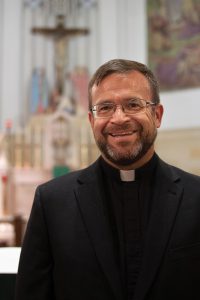
By Katie Eskro
In the June 2020 issue of the Bishop’s Bulletin, Father Scott Traynor describes missionary discipleship as “encountering the love of Jesus Christ, growing in relationship with him, and inviting and helping others to do the same.”
I love this definition. The first thing that strikes me about this description is that the first two steps have to do with us: are we aware of the encounter of Jesus in the events of our everyday lives, and are we growing closer to him and his Church through these ordinary, everyday events?
The last part of the definition, to invite and help others, can only flow from what we’ve received. Indeed, if we are to live the Christian life of community in its full, we are not just sharing morality, an ideal or an intellectual idea. We must share the life and love we’ve received from the Father.
A gift meant to be shared

Father Andrew Dickinson, pastor of Sacred Heart Parish in Aberdeen, says the Christian who has encountered God personally naturally desires to share that encounter. “St. Thomas Aquinas would say that the good and the beautiful are diffusive. They want to be shared. When you encounter something good, you want to share it. And so there’s already within us this natural impulse to share what we have received.”
The way we share our faith looks different for different people, each of us having our own unique personality and temperament, “but everyone has some share in that mission,” says Father Dickinson. And this sharing of our faith and our life does not come from ourselves but from God himself.
“I don’t have the power to cause conversion in someone, but he gives me the grace, and anyone who is open to it, the privilege of working with him,” Father Dickinson says.
We are all meant to live life on mission by inviting the people around us to encounter God’s love, but we don’t have the power or control to make anyone choose to accept God’s invitation. And so, we invite but we wait in patience for God’s work to be done in the heart of the person we are inviting. And while this waiting in patience can be frustrating as it can feel like nothing is happening, Father Dickinson encourages that God is always moving.
“God is never not working in the lives of all the people of this earth, never not offering salvation,” he emphasizes.
Evangelization requires patience
Since growing in patience means letting go of our own desire to control another person’s choices, it involves a measure of suffering.
“The word patience is tied into the word for suffering. If I’m patient, I’m willing to suffer. I’m willing to suffer for the sake of the good that can come,” Father Dickinson says.
Most, if not all, of us experience the suffering of patience in watching loved ones, friends, neighbors and acquaintances dismiss God’s love in their lives. We can continue to lovingly invite them to accept God’s love, “but you can’t force it to happen,” says Father Dickinson.
In those times when we invite others to the Church or make our beliefs known to others and our invitation is refused, Father Dickinson encourages us to remember we are not alone. He says Jesus offers us a gift in these moments if we are willing to accept it.
“Jesus offered himself and on many occasions it was not returned. And so for the missionary disciple, it’s not a failure, rather it’s a new opportunity for a new way to be intimate with Jesus, and for Jesus to be intimate with you, if through your life of disciplined prayer, you take that disappointment to the Lord and look to his answer,” Father Dickinson says.
He also warns against impatience, when we try to push someone toward God or force them to partake in something we think would be good for them.
Before becoming pastor of Sacred Heart in the summer of 2020, Father Dickinson was pastor at the SDSU Newman Center for 11 years. In his experience there, he tells of a time when a missionary invited a student time and time again to a Catholic conference. The student felt so pressured by this missionary that eventually the student stopped even going to Mass. The missionary’s well-intentioned invitation went awry because the missionary pushed the invitation too much.
In these cases, Father Dickinson says we “must be willing to suffer the ‘no.’ A patient urgency would have heard the no, and would have said okay, let’s get to know this person and why they’re saying no. And then loved them in that, and prayed for them with the love of Jesus, and waited to see what Jesus wants.”
Essential to love and freedom

Ellen Bauman, director of Discipleship and Education at St. Lambert Parish in Sioux Falls, recognizes how important it is to be patient with others’ growth and choices. “Patience implies that you’re acknowledging the other person’s freedom,” she says. Without freedom, there can be no love.
“Any diminished amount of patience is a diminished amount of love. It doesn’t mean I don’t share truths; it’s not the kind of freedom that allows the person to have their own way. But there’s a patience to it and a charity to what it is you’re teaching, while at the same time recognizing there’s a whole lot you don’t know about the people in front of you,” says Ellen.
Ellen recognizes that the people she encounters know whether they are being loved through their relationship or whether they’re being imposed upon, and that it is through friendship and a trusted relationship that people become open to God’s invitation.
“I’ve seen the transformation in a person’s heart where they’ve been closed to something, but if there’s a friendship, even if they’re not where you want them to be, I can love them in their journey,” Ellen says. “But that means I’m a part of their life. Is there room to recognize they’re a whole person? Do I have the patience to wonder about who they are as a person? Can I allow that person to show themselves in time?”
This patience can be challenging, and we need to remember that it is God who takes the lead in conversion and formation. He invites us to be co-laborers with him, but it is he who guides. Patience is a necessary virtue for missionary disciples if we are to be faithful to the Lord’s guidance. His timing and his ways often remain mysterious to us, and faithfulness to a life on mission requires trusting obedience.
Growing in patience
 Father Dickinson and Ellen both offer some concrete steps to growing in this patience. Ellen says we must always pray and remain open to God’s plan.
Father Dickinson and Ellen both offer some concrete steps to growing in this patience. Ellen says we must always pray and remain open to God’s plan.
“Praying and asking him to give what I need. Listening, really, really listening to people is super important,” she says.
She also emphasizes that we must be aware of our biases and know our hearts in order to continue following God’s path instead of our own agenda.
Father Dickinson adds we must always begin from a place of gratitude for our experience of missionary discipleship in God’s love.
“Christian discipleship isn’t something I can manufacture; it didn’t happen on my timeline. It’s God’s timeline. And so I have to be humble and receptive to that,” he says.
“Hold on to your desires, but not to your plans,” Father Dickinson emphasizes. “I desire that the entire southern half of Aberdeen, my responsibility at Sacred Heart Parish, would be converted to the love of God and Jesus Christ, as lived and revealed by the power of the Holy Spirit and the sacraments of my Catholic Church, here at Sacred Heart. And I have very many plans on how to do that, but those plans are always flexible, moveable, and I can’t hold onto them too tight. And I’m always prepared for those plans to be frustrated. And I have to be patient with those plans.”
As missionary disciples, you and I are called to live a life of fruitful mission. In that mission we know that God invites us to share his goodness with others, and that we must embrace a patient suffering as we hope and pray for our family and friends to embrace God’s love for them.
In this cross of waiting, we have hope because there is a beauty that arises from waiting and watching for God’s infinite love to be revealed in his time and way. What a gift it is that he invites us to be co-laborers with him in spreading his truth, beauty and goodness to those he has placed on our hearts and in our lives.


